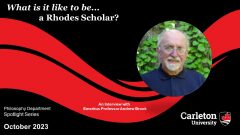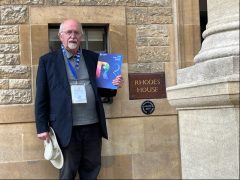Meet Dr. Andrew Brook, Chancellor’s Professor of Philosophy and Cognitive Science Emeritus

Contrary to common belief, summer can be an especially busy time for academics. Most travel to attend conferences and attempt to complete research work before the start of the new academic year. This also applies to retired professors like Andrew Brook, who made the trip to England last summer to attend a major Rhodes scholar reunion in Oxford. Professor Brook was a Rhodes Scholar during his doctoral studies and helped Carleton students receive the award in the past.
Valued at more than $100,000, the Rhodes Scholarship is one of the most prestigious in the world, covering the cost of postgraduate studies at the University of Oxford. Carleton has had several Rhodes Scholars in the past, including most recently Maeve Collins-Tobin, who was one of only 11 students from across Canada selected to receive the award in 2022.
We thought this was a great opportunity to ask Professor Brook about the program, its history, the reunion, and how to apply for a Rhodes Scholarship.
Could you tell us a bit about what the Rhodes Scholarship is, and how you came to earn one?
Professor Brook: When I became a Rhodes scholar, the University of Alberta had a scholarship every year. It being the only university in Alberta and Alberta having a scholarship all to itself, being selected made a bit of a splash but in a pretty small puddle. (Neither has been true for many decades).
What about the origins of the Rhodes Scholarship, we hear it has a troubling past.
Prof. Brook: The origin of the Rhodes scholarship is problematic. Cecil Rhodes used much of his wealth to create a scholarship programme to bring young men from ‘the colonies’ (plus former colonies, the US, and, interestingly, Germany) to Oxford for an education. About $500 million in contemporary value. The first scholarships were awarded in 1903 –hence the 120th anniversary and occasion for the reunion. Woman were not eligible until 1977(!) but, most unusually for the time, all races and all religions were. The US even elected a black scholar in 1905 –and then not again for 50 years! Because Rhodes made his money on the backs of Black people in South Africa and what is now Zimbabwe, the source of the funds has always been a major issue. In the past couple of decades, large donations, including one from a Canadian, John McCall McBain, have diluted the importance of Rhodes’ original bequest and thirty years ago, the Mandela/Rhodes Scholarship was created for precisely the African people that Rhodes exploited. But the issue of how the original money was made remains significant. About 10,000 scholars have been elected in the past 120 years and about half of them are still alive.
The Rhodes Scholar reunion was quite large this year. In fact, it was the largest meeting Rhodes has ever organized! What was it like to see the vastness of the Rhodes community, and to be a part of it? Did you feel especially like a member in a living Rhodes Scholar community?

Prof. Brook: Yes, more than 1/4 of all living scholars were present either in person or on Zoom, including Bob Rae and Bill Clinton. I felt more a part of something special during this event than at any previous time. When I was elected in 1966 it was a fairly sleepy time for the Rhodes Scholarship and I had relatively little to do with the programme or people, being completely immersed in finishing a D. Phil. This time I felt a part of the community.
To be a Rhodes Scholar is a huge honour. Since becoming one when you were a student, what benefits or privileges did it afford you?
Prof. Brook: The Rhodes community had little influence on me while I was in Oxford, though I made some good friends. That was generally true of those of us doing doctorates at the time. Our focus was our academic unit.
What was the topic of your doctoral dissertation and who was your supervisor at Oxford? Did any mentor(s) make a difference for you?
Prof. Brook: Self-Reference and Self-Awareness. The official advisor was (now Sir) Anthony Kenny but I learned the most from (Sir) Peter Strawson (Galen Strawson’s father and the most influential British philosopher of his time). I ended up not agreeing with Strawson about many things to do with Kant but I learned how to do philosophy from his example.
You’ve helped some previous Carleton students become Rhodes Scholars, even helping the University President write letters of support for applicants. What would you say to aspiring Rhodes Scholars to help them prepare their applications, or to encourage them to apply?
Prof. Brook: Carleton has done well in the Rhodes competition for such a young university. Good students! Six Carleton students have been winners, including one this year (Maeve Collins-Tobin). They have been elected from B.C., the Prairies, Quebec, and Newfoundland, as well as Ontario of course. (One can apply where one grew up as well as where one went to school.) My advice to someone thinking of applying? Pay close attention to the guidelines on the Rhodes and the Canadian Rhodes pages, including the criteria by which applications are assessed—the Rhodes programme takes its goal of making the world a better place extremely seriously. Then come and talk to me.
Thanks, Professor Brook, or answering our questions! You can find more about Prof. Brook and his research on his page on our website, and you can find him on PhilPeople. You can find out more about the Rhodes Scholar program on their website. Check out our next Spotlight in November 2023!